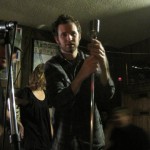 Justin Nicholes is the author of the novels River Dragon Sky (2012) and Ash Dogs (2008). His stories have appeared in The Saint Ann’s Review, Slice, Prick of the Spindle, Cleaver Magazine, Outside In Literary & Travel Magazine, The Summerset Review, Stickman Review, The Medulla Review, and elsewhere. He is the chief editor of The Pavilion literary magazine for expat writing and lives in Xinzheng City, China.
Justin Nicholes is the author of the novels River Dragon Sky (2012) and Ash Dogs (2008). His stories have appeared in The Saint Ann’s Review, Slice, Prick of the Spindle, Cleaver Magazine, Outside In Literary & Travel Magazine, The Summerset Review, Stickman Review, The Medulla Review, and elsewhere. He is the chief editor of The Pavilion literary magazine for expat writing and lives in Xinzheng City, China.
Justin, “The Writer,” a prologue to your story collection, is an interesting work of metafiction. Here, the writer conjures the character of Turtle, a 400-pound man who, because of a car accident, is mentally deficient and carries a titanium plate in his head. He represents life as art. The writer herself, originally from Ohio has come to China to teach English, and takes the reader through the process of her work, and the joys and hardships she’s had in terms of getting published. As an Ohioan writer now teaching in China, yourself, how closely does the writer as portrayed in the story resemble your own thoughts on writing in general, as well as your particular interests in creating fiction based on the lives of Chinese men?
The writer in the story mostly resembles an attitude (or a mood or phase) rather than my overall thoughts on writing. She’s a dedicated writer who’s gone through an MFA and published a little, but she’s starting to become cynical. A lot of writers go through this, I think. At first, when we start nailing down the basics, it seems like we’re close to reaching the point where we can finally get published, where an editor we’ve never met looks at our writing and affirms it with acceptance. But we can’t always be at this point yet. Our fiction isn’t ready. We’re not ready. To quote my former writing teacher Richard Spilman, “Beginners often write as if they were landscape painters trying to get the leaves right”. What Richard means is that, with time, writing day after day makes a writer able to cultivate serious thought or surprise in writing, when what the details were trying to murmur finally gets through to us, and we feel our way through the writing process by placing ourselves in the work.
At the beginning, the writer in this story resembles this landscape painter, not writing as if her life is also at stake, not writing as if getting the story right means at some level life or death. By the end of this short piece, though, she comes to an understanding. The writer’s understanding, yes, does resemble mine when creating fiction. The writing process for me always starts with trying to get the details, then letting those details tell me what the meaning and purpose of the work may be, after I read through it a hundred times and revise.
Continue Reading →
 Cal Freeman was born and raised in West Detroit. He holds a BA in literature from University of Detroit Mercy and an MFA from Bowling Green State University. His writing has appeared in many journals including Commonweal, The Journal, Nimrod, Drunken Boat, Ninth Letter, and The Paris-American. He currently lives in Dearborn, MI and teaches at Oakland University.
Cal Freeman was born and raised in West Detroit. He holds a BA in literature from University of Detroit Mercy and an MFA from Bowling Green State University. His writing has appeared in many journals including Commonweal, The Journal, Nimrod, Drunken Boat, Ninth Letter, and The Paris-American. He currently lives in Dearborn, MI and teaches at Oakland University.

